Fintech-powered earned wage access (EWA) has been gathering momentum for nearly a decade, enabling cash-strapped workers to receive a portion of their wages before the usual biweekly payday through digital channels. In that time, EWA has become a hotbed of innovation as fintechs continue to increase the speed and convenience of receiving funds.
But EWA products are also generating controversy, with consumer advocates claiming frequent usage of certain fee-based EWA services can cost almost as much as a
Many fintechs work directly with payroll firms or employers — Walmart is one example — to offer EWA services for free. Others charge a fee ranging from about $1.99 to about $4.99 for each wage-advancement. A handful of other fintechs market EWA products directly to consumers, a practice that consumer advocates fear could lead to misuse due to providers' inability to directly verify participants' income.
Recent data from Sapient Insights Group suggests at least 13% of employers offer earned wage access to workers, and about 30% are planning to do so, as consumer demand for immediate wages rises.
"New technologies such as faster payments, real-time updates and digital accounts can help people manage their money with minimal disruption, and these technological advances are helping EWA users," said Brian Tate, CEO and president of the Innovative Payments Association, a trade group based in Washington, D.C. Last week, the organization launched a website, EarnedWageAccess.info, to raise awareness of the expanding industry.
Here are some recent innovations and milestones of leading U.S. EWA providers.










